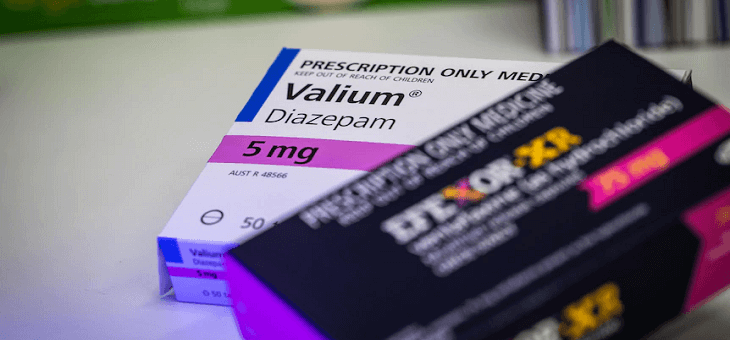Anxiety is the most common mental health condition in Australia.
One in four Australians have experienced some form of clinical anxiety in their life — that’s the same percentage of people in this country who were born overseas.
Counselling from a psychologist is widely accepted as the most effective treatment option for people struggling with anxiety, but medication can play an important role if the symptoms are more severe.
“Medication can be extremely helpful for anxiety, especially if you are talking about anxiety at the pointier end,” says Ahona Guha, a clinical and forensic psychologist in Melbourne.
“Think about it a little bit like a crutch for a broken leg, it really just helps us move through life while we are learning to walk again.”
Let’s take a look at the most commonly prescribed medications and how they can ease anxiety.
Antidepressants
Some types of antidepressants are very effective in managing anxiety, even in people who do not have depression.
In fact, the use of antidepressants in managing a range of mental health concerns in Australia has more than doubled over the past 20 years.
Clinical anxiety is caused by an imbalance in the chemicals in the brain. Depression is caused by a different imbalance in those same chemicals.
Antidepressants can be effective in treating both anxiety and depression because both are caused by different imbalances in the same chemicals in the brain.
Antidepressants are designed to correct that imbalance.
They won’t work for everyone, but they can be very effective when they do.
SSRI
Selective Serotonin Reuptake Inhibitors (SSRIs) are an extremely common form of antidepressant prescribed to people with anxiety.
It will often be a doctor’s first choice of medication because most people tolerate it pretty well without side-effects.
SSRIs manage the brain’s levels of serotonin, which is a chemical that regulates anxiety, happiness and mood.
SSRIs are among the most frequently sold drugs in Australia. Sertraline (sold under the brand name Zoloft) and escitalopram (Cipralex and Lexapro) are both among Australia’s 10 most commonly prescribed medications.
Fellow of the Royal Australian and New Zealand College of psychiatrists, Professor Valsamma Eapen, says SSRIs take a while to start to take effect.
“They will at least take two weeks to begin to act, and then it takes six, eight, 12 weeks to really have the levels built up sufficiently to show you the benefits,” she says.
Doctors are likely to prescribe SSRIs as a first medication for anxiety because they have a good history of research behind them, she adds.
“We have more evidence, more studies and more clinical experience with SSRIs.”
SNRI
Serotonin and Noradrenaline Reuptake Inhibitors (SNRIs) manage serotonin levels, like SSRIs, but also manage noradrenaline.
Noradrenaline is a chemical that plays a vital role in the fight or flight response, and impacts on blood pressure and heart rate.
Venlafaxine, sold as Effexor, is the most common SNRI prescribed by doctors in Australia.
Medications managing two chemicals in the brain, as SNRIs do, are more likely to come with side-effects, Dr Eapen says.
“SNRIs are relatively new,” she explains.
“Some of the side-effects that you get are from that noradrenaline effect, as opposed to the fewer serotonin side-effects.”
Benzodiazepine
Benzodiazepines are a type of sedative commonly prescribed for short-term treatment of anxiety symptoms.
They reduce tension and promote relaxation, but can affect coordination and alertness, and are known to be addictive and grow less effective with longer term use.
Valium and Xanax are among the most well-known brands of benzodiazepines.
A doctor will ordinarily prescribe benzodiazepines for just a couple of weeks, or intermittently as part of a broader treatment plan.
Dr Eapen says they come in handy when someone is experiencing extreme symptoms that can’t wait for the adjustment period of other medications.
“When someone is experiencing acute grief or acute panic — something where you need to see an effect straight away — with benzodiazepine you get the benefit straight away,” she says.
“When you can see that this is an acute situation and not chronic anxiety where you can use the SSRI and grin and bear those two weeks — you know that this is an acute stress reaction and you can’t wait that long.
“The main disadvantage is because it acts so quickly it’s addictive, so you get used to it and won’t learn any coping strategies.”
Beta blockers
Beta blockers work by inhibiting adrenaline, the other chemical that runs the fight or flight response.
Like benzodiazepines, beta blockers don’t treat the anxiety itself, but can help ease symptoms such as shaking, sweating, dizziness and heart racing.
“Beta blockers are helpful when the symptoms of anxiety are physical,” Dr Eapen says.
“It’s the arousal system that you are blocking, but it won’t help with the cognitive symptoms of anxiety like the worry.”
Some common beta blockers include atenolol (Tenormin) and metoprolol (Lopresor).
How are medications prescribed?
The first step in seeking help for anxiety, whether it be for starting therapy or a medication routine, is to see a GP.
“The GP will assess you to ensure it’s not due to something else, because sometimes other things can present like anxiety,” Dr Eapen says.
If a GP concludes that medication would help, they can prescribe some medications directly, or give a referral to a psychiatrist.
Psychiatrists often prescribe antidepressants, but the vast majority (86 per cent) in Australia are prescribed and managed by GPs.
All of the types of medications discussed in this article are covered by the Pharmaceutical Benefits Scheme (PBS), which makes them more affordable.
 © 2020 Australian Broadcasting Corporation. All rights reserved.
© 2020 Australian Broadcasting Corporation. All rights reserved.
ABC Content Disclaimer

